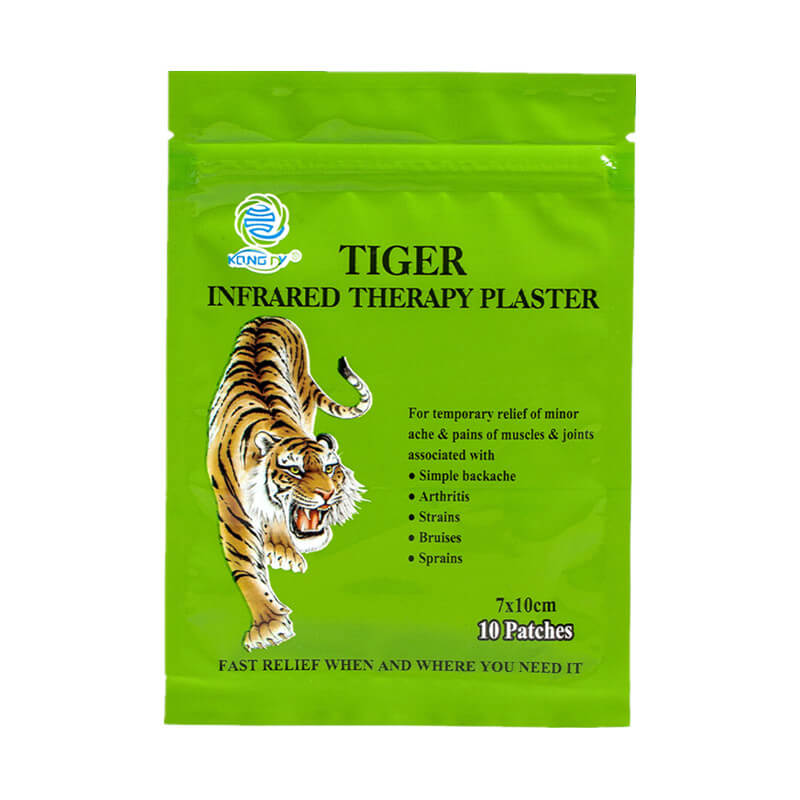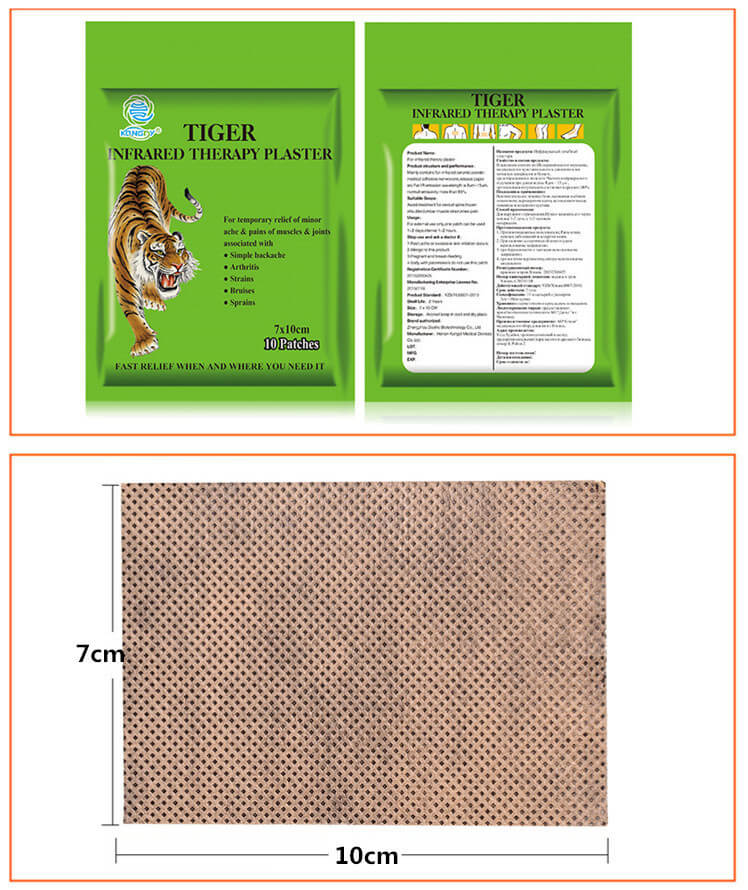How Does Private Labeling Work for Tiger Infrared Therapy Plasters?
Private labeling is an effective strategy for businesses looking to enter the healthcare and pain relief market without the complexities of product development and manufacturing. By leveraging private labeling, companies can offer high-quality Tiger Infrared Therapy Plasters under their own brand name, while the manufacturing and technical processes are handled by a third-party Tiger Infrared Therapy Plaster Manufacturer or Tiger Infrared Therapy Plaster OEM (Original Equipment Manufacturer). This allows businesses to focus on marketing, sales, and customer relationships, while leaving the production expertise to an experienced supplier.
In this article, we’ll dive into how private labeling works for Tiger Infrared Therapy Plasters, the benefits it offers, and how businesses can capitalize on this opportunity. We'll also cover how private labeling helps with branding, customization, and market differentiation, as well as the role of an OEM in the process.

1. What is Private Labeling for Tiger Infrared Therapy Plasters?
Private labeling refers to the process in which a company (the buyer) works with a Tiger Infrared Therapy Plaster Manufacturer to produce a product that is then branded and sold under the buyer’s own name. The buyer does not develop the product or own the formula—these are typically the responsibilities of the manufacturer. The product is essentially ready-made, but it is rebranded and packaged according to the buyer’s specifications.
For Private Label Tiger Infrared Therapy Plasters, the manufacturer produces high-quality infrared therapy plasters with proprietary or standardized formulations. These plasters combine traditional pain-relieving ingredients (e.g., menthol, camphor, or capsaicin) with infrared heat technology to deliver targeted pain relief. The buyer can choose from a range of pre-formulated products and have them customized with their own packaging, logo, and marketing materials.
2. How Does the Private Labeling Process Work?
The process of private labeling involves several key steps, allowing companies to quickly get their product to market with minimal hassle. Here’s a breakdown of how private labeling works for Tiger Infrared Therapy Plasters:
Step 1: Selecting a Manufacturer or OEM Partner
The first step is choosing a reliable Tiger Infrared Therapy Plaster OEM or Tiger Infrared Therapy Plaster Supplier. It's crucial to select a manufacturer with a track record of producing high-quality infrared therapy plasters and the ability to meet your business needs. The OEM will handle the production, formulation, and testing of the product, ensuring it meets all safety and regulatory requirements.
Step 2: Choosing a Pre-Formulated or Custom Product
When working with a Tiger Infrared Therapy Plaster Manufacturer, you typically have two options: choosing from pre-existing formulas or creating a Custom Tiger Infrared Therapy Plaster. If you opt for pre-formulated products, the process is quicker and simpler, as the formulation has already been developed and tested. However, if you want a product tailored to your brand's specific needs, you can work with the OEM to develop a custom formula, incorporating different ingredients or adjusting the strength and effectiveness of the infrared technology.
Step 3: Designing Packaging and Branding
Once the product is selected, the next step is designing the packaging and branding. As part of private labeling, the manufacturer will produce the product under your brand name, using your logo, brand colors, and marketing messaging. The ability to customize packaging is a major advantage of private labeling, as it allows you to differentiate your product from competitors and create a unique brand identity. An OEM can help you with packaging materials, design options, and labeling that complies with industry regulations.
Step 4: Production and Quality Control
After finalizing the product and packaging design, the Tiger Infrared Therapy Plaster Supplier will begin mass production. The manufacturer will handle all aspects of production, from sourcing raw materials to assembling the plasters, applying the infrared technology, and packaging the final product. Quality control is a critical aspect of this process, ensuring that the finished plasters meet industry standards for safety, effectiveness, and consistency.
Step 5: Distribution and Sales
Once production is complete, the finished products are shipped to your distribution center, ready for sale. Depending on the agreement with the OEM, they may also offer logistics and shipping services, handling distribution on your behalf. Now, your job as a brand is to focus on marketing and selling the Private Label Tiger Infrared Therapy Plaster to your target audience, either through online sales, retail partnerships, or direct-to-consumer channels.
3. Benefits of Private Labeling for Tiger Infrared Therapy Plasters
Private labeling offers numerous benefits for companies looking to enter the pain relief market without the complexity of product development. Some of the most significant advantages include:
Faster Time to Market
Private labeling allows businesses to get their products to market much faster than if they were to develop and manufacture their own. The product is already developed and tested by the OEM, meaning you can launch it quickly under your own brand name. This is particularly beneficial in competitive markets where speed is crucial.
Lower Upfront Costs
Developing a product from scratch requires substantial investment in research, development, manufacturing equipment, and regulatory compliance. Private labeling significantly reduces these upfront costs because the Tiger Infrared Therapy Plaster Manufacturer has already done the heavy lifting. You only need to invest in branding, packaging, and marketing, making it more cost-effective for small and medium-sized businesses.
Branding Opportunities
Private labeling allows you to build a unique brand identity. You can create packaging and marketing materials that resonate with your target audience, enabling you to position your product in a way that stands out from competitors. A Custom Tiger Infrared Therapy Plaster with distinctive packaging and branding can drive brand loyalty and make your product memorable to consumers.
Flexibility and Customization
While the product itself may come from a standard formula, there is still room for customization with private labeling. You can choose different formulations, ingredients, and packaging options that align with your brand vision. This flexibility allows you to tailor the product to the specific preferences of your target market.
Focus on Sales and Marketing
With the technical aspects of manufacturing handled by the OEM, you can focus your resources and energy on building a sales strategy and marketing your product. Private labeling frees you from the complexities of production, allowing you to concentrate on what you do best—selling and growing your business.
4. Key Considerations When Choosing a Tiger Infrared Therapy Plaster OEM
Choosing the right Tiger Infrared Therapy Plaster Supplier or OEM partner is critical to the success of your private label venture. Here are some factors to consider:
Reputation and Experience: Look for a manufacturer with a strong track record in producing high-quality infrared therapy plasters. Research their expertise in the healthcare industry and read customer reviews to ensure they are reliable.
Product Quality: Ensure that the OEM uses high-quality materials and ingredients in their products. Verify that their plasters comply with safety and efficacy regulations.
Customization Options: If you want to create a unique product, make sure the OEM offers customization services. This includes flexibility in ingredients, packaging, and design.
Regulatory Compliance: Your OEM partner should be familiar with the regulatory requirements for medical and pain relief products in your target market. They should handle product testing and certification to ensure compliance.
5. Related Questions and Answers
Q1: What is the role of a Tiger Infrared Therapy Plaster OEM in private labeling?
A1: An OEM handles the production, formulation, and packaging of Tiger Infrared Therapy Plasters, allowing you to focus on branding and selling the product under your own name.
Q2: Can I customize the packaging of a Private Label Tiger Infrared Therapy Plaster?
A2: Yes, you can work with the OEM to design custom packaging that reflects your brand identity, including logos, colors, and product information.
Q3: How long does it take to launch a Private Label Tiger Infrared Therapy Plaster?
A3: The timeline varies depending on the level of customization, but private labeling is typically faster than developing a product from scratch, often taking a few months to complete.
Q4: Do I need to worry about regulatory compliance with private labeling?
A4: No, the OEM will handle all regulatory compliance, including product testing and certification, to ensure your product meets industry standards.
Q5: Can I sell a Private Label Tiger Infrared Therapy Plaster in different markets?
A5: Yes, private labeling allows you to sell your branded product in various markets, provided the product complies with local regulations in each market.
Conclusion
Private labeling is a powerful tool for businesses looking to enter the pain relief market with Tiger Infrared Therapy Plasters. By partnering with a trusted Tiger Infrared Therapy Plaster OEM, you can quickly bring a high-quality product to market with minimal investment in research and development. With the ability to customize packaging, branding, and even ingredients, private labeling allows you to create a unique product that resonates with your target audience. Focus on your brand’s strengths—marketing, sales, and customer relationships—while leaving the technical details to a reliable manufacturer.






